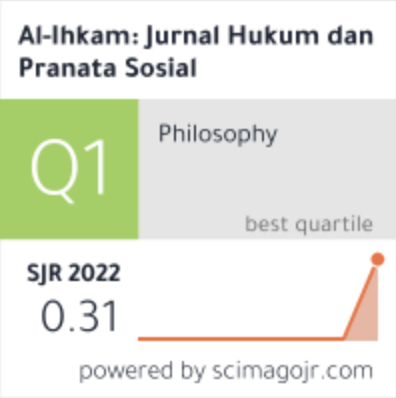Memperkuat ’Urf dalam Pengembangan Hukum Islam
 Abstract views: 1315
,
Abstract views: 1315
,
 PDF downloads: 545
PDF downloads: 545
 PDF downloads: 657
PDF downloads: 657
Abstract
Sejauh ini, keberadaan ’urf sebagai sumber hukum Islam tidak menonjol. Padahal `urf memiliki posisi penting untuk pengembangan Islam di Nusantara yang kaya budaya. `Urf dapat menjadi pembendung kolompok yang anti terhadap tradisi lokal. Para ulama sejatinya telah berbicara panjang lebar tentang ’urf sebagai dasar hukum. Para mujtahid dan mufti disyaratkan menguasai tradisi suatu masyarakat dan cermat mempertimbangkannya. Untuk itu diperlukan upaya penguatan ‘urf dalam rangka pengembangan hukum Islam agar dapat tetap berperan di masa depan. Tujuan itu dapat dilakukan dengan beberapa langkah, yaitu memperbaiki cara memahami dan mendudukkan nash sebagai landasan utama hukum Islam, menegaskan posisi fiqih sebagai hasil ijtihad manusiawi yang historis dan kultural, dan melakukan negosiasi antara doktrin Islam dengan tradisi sekaligus menciptakan tradisi baru sebagai wujud penerjemahan doktrin yang bersifat mutlak. (The existence of 'urf as one of sources of Islamic law is not dominant while it has an important position in the context of Islamic development in Indonesia, which is rich of culture and tradition. `Urf can be a barrier against those who are anti-local traditions. Actually, Islamic scholars have discussed a lot about ‘urf as the legal basis in the context of Islamic law. Mujtahid (experts in islamic law) and mufti (advisers on religious law) are required to be knowledgable of the traditions of a society and carefully consider them.Therefore, it is necessary to strengthen the 'urf for developing Islamic law in order to keep it playing a role in the future. In so doing, it is necessary to take several steps; improving the way to understand and place the texts of the Quran as the main foundation of Islamic law, affirming the position of Islamic jurisprudence as the result of historical and cultural human interpretation and judgement (ijtihad), and negotiating between Islamic doctrine and tradition while creating new traditions as a form of absolute doctrinal translation.
Downloads
References
Asad, Talal, The Idea of an Anthropologi of Islam, Georgetown University, Washington, 1986.
Henninger, Joseph, “Pre-Islamic Bedouin Religion,” dalam Marlyn L. Swartz (ed. & trans.) Studies on Islam, Oxford University Press, New York, 1981.
Khaldun, Abd al-Rahman Ibn, Muqaddimah li Kitâb al-‘Ibar wa Dîwân al-Mubtadâ wa al-Khabar fi Ayyâm al-‘Arab wa al-‘Ajam wa al-Barbar wa Man ‘Âsharahum min Dzawi al-Shulthân al-Akbar, Dar al-Kutub al-‘Ilmiyyah, Beirut, 1992.
Karim, Khalil Abdul, Historisitas Syari’ah Islam, terj. M. Faisol Fatawi, Pustaka Alief, Yogyakarta, 2003.
Khallaf, Abd al-Wahhab, ‘Ilm al-Ushûl al-Fiqh, Dar al-Qalam, Kairo, 1978.
Khayyath, Abd al-Aziz al-, Nadzariyyat al-‘Urf, Maktab al-Aqsha, Amman, t.t.
Mahasin, Aswab, “Masyarakat Madani dan Lawan-Lawannya: Sebuah Mukadimah” (Kata Pengantar) dalam Ernest Gellner, Membangun Masyarakat Sipil Prasyarat Menuju Kebebasan, Mizan, Bandung, 1995
Mahfudz, M. A. Sahal, Fiqih Sosial: Upaya Pengembangan Madzhab Qauli dan Manhaji, pidato penerimaan Gelar Doktor Honoris Causa Bidang Fiqih Sosial, Universitas Islam Negeri (UIN) Syarif Hidayatullah Jakarta, 2003.
Masood, M. Khalid, Islamic Legal Philosophy, A. Study of Abu Ishaq al-Shatibi’s Life and Thought, International Islamic Publisher, Delhi, 1989.
Mulkhan, Abdul Munir, Islam Murni dan Masyarakat Petani, Bentang Budaya, Yogyakarta, 2000.
-----, “Muhammadiyah dan Keragaman BudayaLokal,” dalam Zakiyuddin Baidhawy dan Mutohharun Jinan, Agama dan Pluralitas Budaya Lokal, Pusat Studi Budaya dan Perubahan Sosial Universitas Muhammadiyah Surakarta, Surakarta, 2003.
Peters, F.E., Mohammad and the Origin of Islam, State University of New York State, New York, 1995.
Qaradhawi, Yusuf al-, Madkhal li Dirâsah al-Syarî’ah al-Islâmiyyah, Maktabah Wahbah, Kairo, 2001.
Qarafi, Syihab al-Din al-, Anwâr al-Burûq fî Anwâ’ al-Furûq, Dar al-Kutub al-‘Arabiyyah, Kairo, 1344 H.
Schacht, J., Introduction to Islamic Law, Clarendon, Oxford, 1966.
Sunnah, Ahmad Fahmi Abu, Al-‘Urf wa al-‘Âdat fi Ra’y al-Fuqahâ’, Dar al-Fikr al-‘Arabi, Mesir, t.t.
Surjo, Joko, dkk., Agama dan Perubahan Sosial; Studi Tentang Hubungan Antara Islam, Masyarakat dan Struktur Sosial-Politik Indonesia, Pusat Studi Antar Universitas-Studi Sosial UGM. Yogyakarta, 1993.
Watt, Montgomery, Muhammad, Prophet and Statesman, Oxford University Press, New York, 1961.
Zarqa’, Mushthafa, Al-Madkhal ‘ala al-Fiqh al-‘Âm, Dar al-Fikr, Beirut, 1968.
Zuhaili, Wahbah al-, Ushûl al-Fiqh al-Islâmî, Dar al-Fikr, Damaskus, 1986.
In order to be accepted and published by Al-Ihkam: Jurnal Hukum dan Pranata Sosial, author(s) submitting the article manuscript should complete all the review stages. By submitting the manuscript, the author(s) agreed to the following terms:
- The copyright of received articles shall be assigned to Al-Ihkam: Jurnal Hukum dan Pranata Sosial as the publisher of the journal. The intended copyright includes the right to publish articles in various forms (including reprints). Al-Ihkam: Jurnal Hukum dan Pranata Sosial maintain the publishing rights to the published articles.
- Authors are permitted to disseminate published articles by sharing the link/DOI of the article at Al-Ihkam: Jurnal Hukum dan Pranata Sosial. Authors are allowed to use their articles for any legal purposes deemed necessary without written permission from Al-Ihkam: Jurnal Hukum dan Pranata Sosial with an acknowledgment of initial publication to this journal.
- Users/public use of this website will be licensed to CC-BY-SA.



.png)
_1.png)










